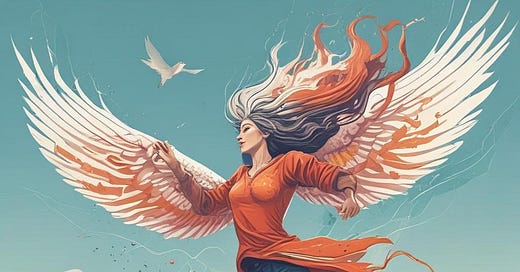True Love is Freedom
How we nurture and share freedom and offer it to others (or not) determines our destiny and reflects our deepest values.
David Whyte’s poem “The Truelove” explores the idea that our greatest love is a deep, intrinsic connection to freedom. Our current cycle of change challenges us to revisit our notion of freedom, how we live in freedom together, and how we thrive by not protecting it but nourishing it. We nourish freedom because it informs our greatest human potential and sea of possibility. How we nurture and share freedom and offer it to others (or not) determines our destiny and reflects our deepest values.
Ponder this by reading Whyte’s “The Truelove” and consider how it informs our conscious action around freedom:
1. Freedom as Inner Experience: The poem delves into true love as an internal state of being. It suggests true love is not just about external relationships but an inner sense of freedom and fulfillment. The poem’s language and imagery often reflect inward journeys, emphasizing personal freedom and self-discovery.
2. Symbolism of the Ocean: The ocean in the poem symbolizes vastness, openness, and limitless possibility—attributes of freedom. Immersion in the sea signifies surrender to this expansive freedom, hinting that true love involves embracing the boundless nature of one’s spirit.
3. Transcendence and Transformation: Whyte often writes about transformation and the transcendent aspects of human experience. In “The Truelove,” the experience of true love transforms the individual, suggesting that true love liberates the self from constraints and leads to a profound sense of freedom.
4. Unity and Wholeness: Whyte conveys a sense of unity and wholeness from experiencing true love. This unity can be interpreted as the alignment with one’s true nature and the freedom that comes from living authentically. In this sense, true love is the freedom to be wholly oneself.
5. Metaphorical Death and Rebirth: The imagery in the poem, particularly the sense of drowning and emerging anew, reflects a symbolic death and rebirth. This process is akin to achieving freedom through shedding old identities and embracing a more liberated self. Can this lead us in the United States and beyond to transform our notion of freedom for a more equitable, loving, and beautiful world?
In summary, David Whyte’s “The Truelove” portrays freedom as our greatest love by illustrating it as an inner state of authenticity, transformation, and boundless possibility. The poem suggests true love is the freedom to be oneself wholly and profoundly. (To hear Whyte read the poem: LISTEN here )
How might you consciously apply this to our current state of affairsin the United States and the world? How we nurture and share freedom and offer it to others (or not) determines our destiny and reflects our deepest values.
Reply
Forward




